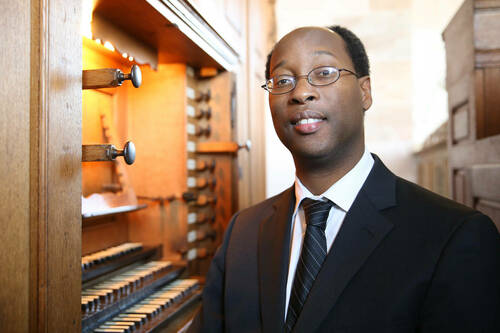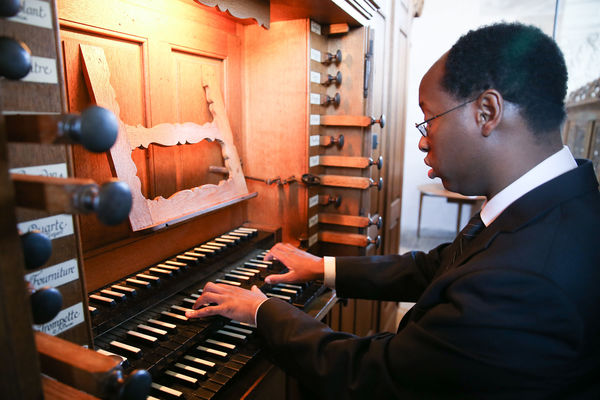
Acclaimed organist Kola Owolabi will join the faculty of the Department of Music and Sacred Music at Notre Dame this fall as professor of music and head of the Graduate Organ Studio.
Owolabi — whose expertise includes a broad range of organ repertoire, composition, choral conducting, church music and improvisation — will replace Craig Cramer, who is retiring at the end of the academic year.
“Kola Owolabi is a consummate virtuoso organist, scholar and pedagogue with a deep commitment to the performance of new music and the music of African American composers,” said Mark Doerries, acting director of Sacred Music at Notre Dame. “He is well poised to continue the historical organ legacy of Craig Cramer, who has been influential in the organ landscape of Notre Dame for 39 years, while also extending our musical gamut into contemporary and diverse music and composers.”
Owolabi comes to Notre Dame from the University of Michigan, where he has taught courses in organ performance, improvisation and sacred music since 2014.
Before that, he taught at Syracuse University — where Owolabi got to know Cramer after inviting him to participate in a series of organ recitals. Owolabi also performed at the DeBartolo Performing Arts Center in 2016 and offered a masterclass for Notre Dame organ students.
“Since my time at Syracuse, Craig has been a real mentor to me,” Owolabi said. “But through the years, it never occurred to me that I would be chosen to be his successor. It’s an honor to follow in his footsteps.”
Owolabi, who has a master’s degree in music from Yale University and a doctorate of musical arts from Eastman School of Music, was drawn to Notre Dame because of the quality of its music programs.
“Notre Dame has one of the best sacred music programs in the country,” he said. “The faculty are all internationally renowned scholars, and the breadth of scholarship is amazing. But what really struck me when I interviewed was the sense of collegiality and support among the faculty — and that is something the students benefit from as well.”
Global perspective
An accomplished solo recitalist and composer, Owolabi has performed at prestigious venues across the United States and internationally, including the Klosterneuburg Abbey in Austria; Église du Bouclier in Strasbourg, France; and the University of the West Indies in Mona, Jamaica. He has also performed as an organist and harpsichordist with the Grammy-nominated vocal ensemble Seraphic Fire and the Firebird Chamber Orchestra, based in Miami.
He has released two solo recordings, Sacred Expressions: Twentieth-Century Music for Organ, featuring the iconic Walter Holtkamp organ at Syracuse University, and Jacques Boyvin: Four Suites from the Second Livre d’Orgue (1700), performed on the 1732 Andreas Silbermann organ in Saint-Maurice Abbey in Ebersmunster, France.
One of his next projects is to record the 12 toccatas of Baroque composer and organist Georg Muffat on a historic instrument in the south of Germany.
Owolabi, a native of Canada who spent part of his childhood in Nigeria, has also been commissioned by the Old Salem Museum in Winston-Salem, North Carolina, to write a piece inspired by the African American tradition to celebrate the life of Peter Oliver, a freed slave who served as a “bellows treader” for a local Moravian organ at the turn of the 19th century.
“I’m looking forward to doing more composing at Notre Dame,” he said. “Just being in an environment where Catholicism is at the center of the culture will also inspire me to get back into writing music for the church, which has been my primary focus.”
Building relationships

Owolabi plans to build on the strengths of the organ performance program, including creating more formalized coursework in worship playing, creative hymn playing and liturgical improvisation.
“There has always been an excellent focus on performance, and the students get a lot of experience as church musicians through internships with area churches,” he said. “I plan to develop courses that help build a connection between the instruction they already receive and the skill set they develop in their internships.”
He also plans to integrate more contemporary repertoire and works from underrepresented traditions into the curriculum — including African American composers, Latino/a composers and women composers.
Another strength of the program, Owolabi said, is its emphasis on interdisciplinary collaboration. He looks forward to building relationships with colleagues in medieval studies, liturgical studies and theology — and said that a broad-based liberal arts education is essential for his students as well.
“The more well-rounded the students can be in their studies, the better off they will be professionally,” Owolabi said. “As church musicians, they will have the ability to work collaboratively with clergy and other members of a pastoral staff and, to a certain extent, be able to speak the language of their colleagues because of their experience in liturgical theology, for example. Notre Dame really offers that broader, richer approach to learning.”
Originally published by at al.nd.edu on April 22, 2020.